ONBOARDING FEATURE MOBILE APP
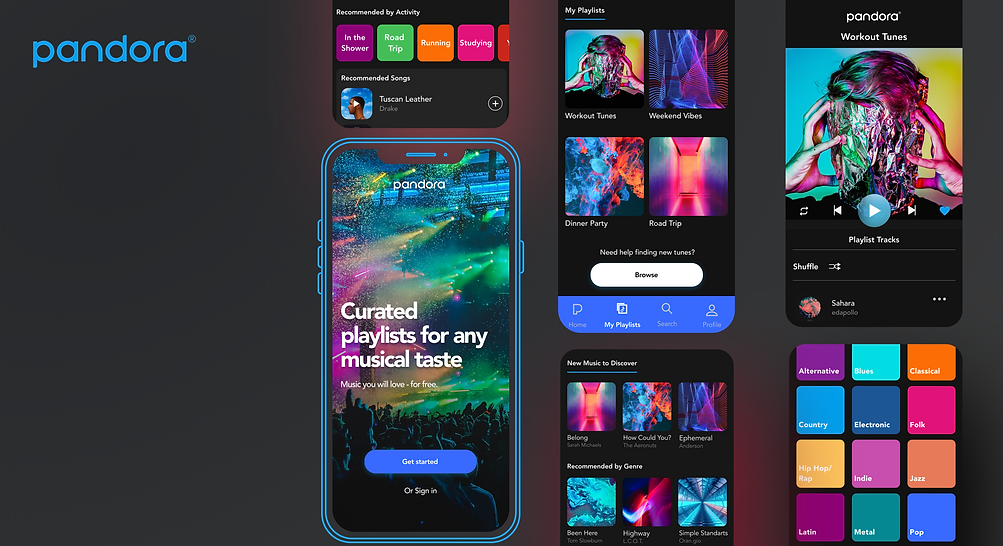.png)
COMPANY
UX, UI, PROJECT MANAGER
MY ROLE
TOOLS
DURATION
2 WEEKS SPRINT
PROJECT SUMMARY
Pandora Media, a pioneer in music streaming, remains one of the biggest music platforms in the United States. As the music streaming industry grew and competitors started monetizing through a premium subscription model, Pandora’s numbers began declining.
As the early market leader, Pandora must continue to innovate in order to bring their users the best a music streaming service can offer.
The new onboarding experience on Pandora’s application lets users easily curate playlists based on their preferred musical taste so that they can continuously enjoy a fresh repertoire of music.
The Challenge
Along with a team of two other UX Designers and researchers, I was tasked with the challenge of identifying the root causes of Pandora's decline in listenership, and proposing some design interventions to offer a better application to Pandora’s more than 65 million monthly listeners.
RESEARCH
To better understand the music streaming service landscape, we conducted an analysis of Pandora’s competitors.
C&C Analysis




The numbers revealed a clear picture as to why Pandora's listenership has steadily declined since 2016.
Global Monthly Subscribers
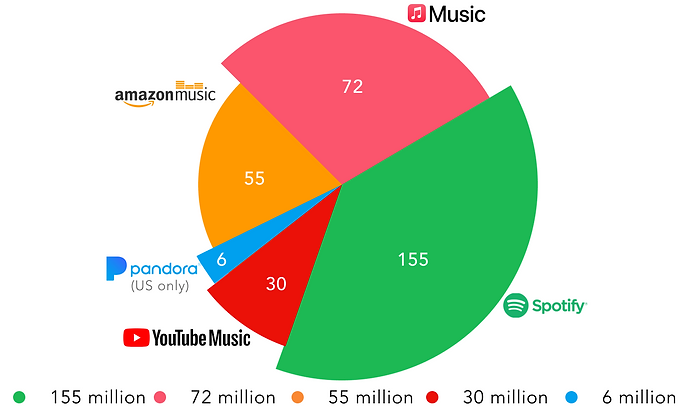
Countries Where They Are Available

U.S. Monthly Users

.png)

.png)
Considering Pandora only operates in the United States, their 65 million monthly users is competitive with the domestic listenership of other major streaming services.
Spotify, however holds the greatest market share globally, and is broadly viewed as trendsetting in the music streaming industry. As such, users may look to Spotify as a model for what to expect from a music streaming app.
As Designers, and problem solvers, these numbers informed us that we needed to make it clear to new users what to expect from Pandora right away.
Gathering Data:
User-Centered Design
We conducted a study with 7 music streaming service users ranging from mid 20’s to mid 30’s were interviewed. We eagerly wanted to know:
-
What music streaming platforms they used and for how long?
-
What features they liked or didn’t like?
-
Most importantly - what kept them going back?
What We Learned
In our research, we found that many users:
-
Have limited experience with Pandora
-
Love curated playlists and recommendations to help them discover new music
-
Prefer different types of music for different activities
To help us better visualize Pandora’s target audience we created a persona.
Meet Julius
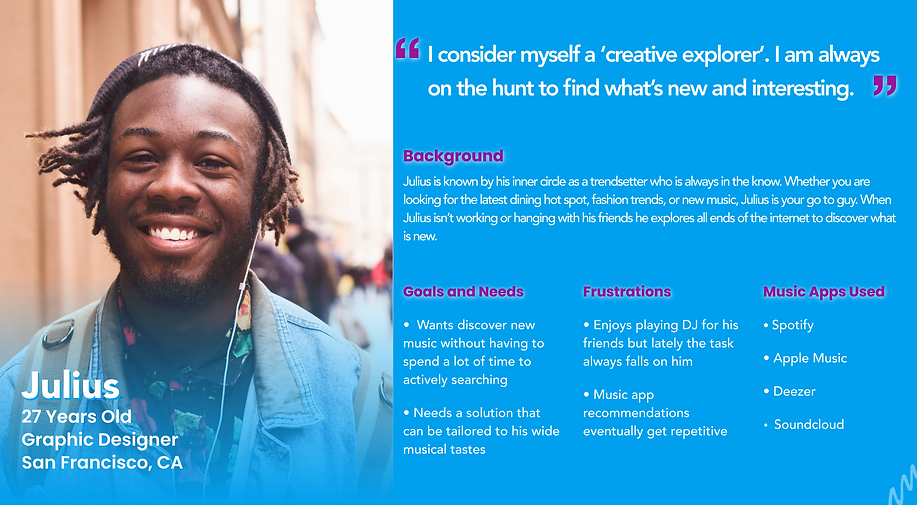
How Can We Help? The Challenge
So, what could we design to help new users like Julius become loyal Pandora listeners?
It is likely our target audience has already been using other streaming services for years and may not be willing to spend a ton of time trying to understand a new music app. So we needed a fast and effective way of getting the user acclimated and listening to their first playlist. One way we could make that happen is by guiding users through onboarding when they first sign up. This onboarding would have the user create a playlist so they can see how flexible and easy it is. At the same time, Pandora can learn about the user’s preferences and use that to tailor recommended playlists
The Hypothesis
By creating an onboarding experience we sought to educate new users on the value Pandora provides. As users came to better understand the platform, we hoped to see increased repeat listenership within the first week, a leading indicator of long term listenership.
DESIGN
Exploring Solutions
Our team ideated using the design studio technique by sketching different solutions, then pitching our ideas to one another, and sharing feedback. Ultimately, we merged our ideas, converging on a final design.



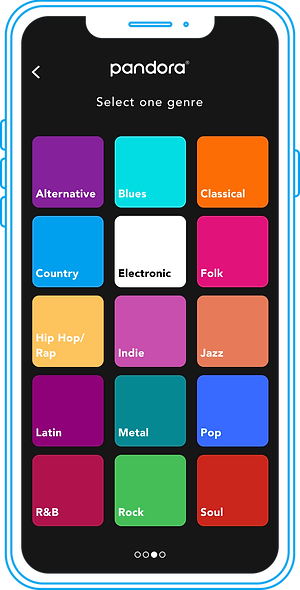

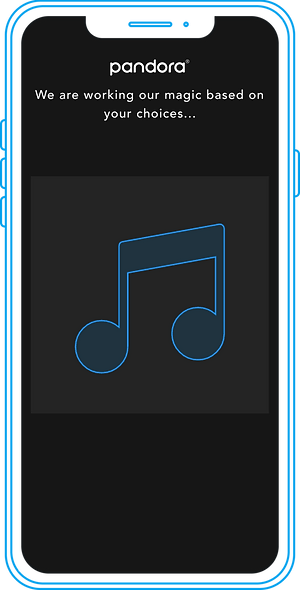
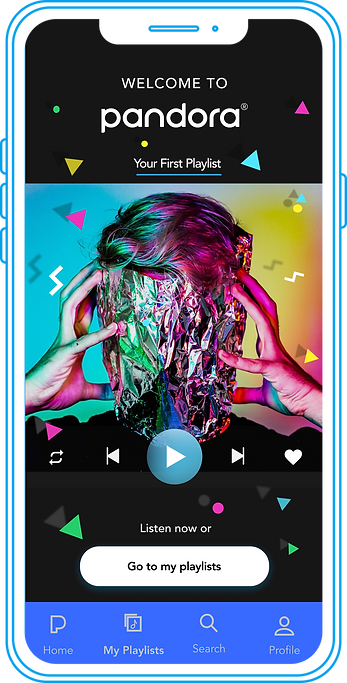
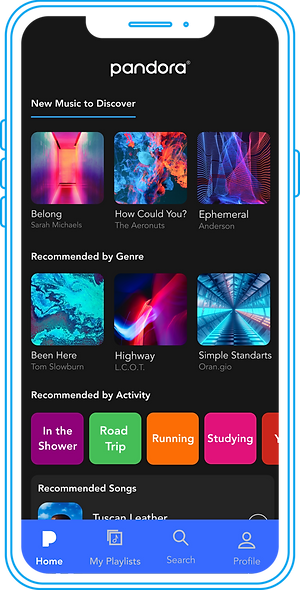


USABILITY TESTING
Our goal throughout the design process was to have potential users
-
Come to the app,
-
Easily create a first playlist,
-
Stay in the app while listening to that playlist
-
Keep coming back
Click Through Prototype
What We Learned
-
2 out of 3 users understood what to expect by reading the first welcome page
-
Everyone appreciated the ability to create a playlist based on activity
-
Users knew exactly where to look to find music recommendations within the app
-
Users had very different expectations from what their selections would actually result in. Would they receive a single playlist with all the genres they selected, or multiple playlists?
-
3 out 3 users found the app and the onboarding process very intuitive
-
3 out of 3 users indicated that selecting “activity” to inform playlist creation was their favorite aspect of the onboarding experience
-
All 3 users wanted to create a playlist based on that instead of genre
NEXT STEPS
Usability Testing revealed that users LOVE the activity feature! Therefore, my team highly recommends further research to validate our initial findings around that feature, and to fully understand how we can help our users maximize its value.
